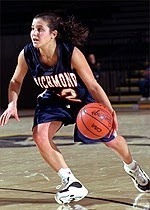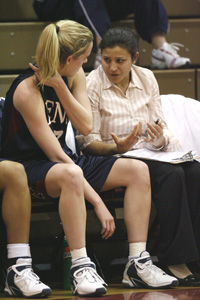|
|

| July 2007 Whether Center Court or Courtside, Michele "Belle" Koclanes, '02, at Top of Her Game Michele “Belle” Koclanes, ’02, has shattered a few stereotypes in her time, including the one about the low academic performance of student-athletes and the one about the need to be tall to play competitive basketball. The five-foot-one-inch brunette excelled in a sport usually reserved for athletes of much larger stature. “I never felt small on the court,” Koclanes said, “and I never looked at being small as a disadvantage, but as an advantage. “You always hear coaches telling their players to bend down—well, I was already down. You just have to out-think your opponent if you can’t out-physical them.” Koclanes ended her college basketball career on a high in February 2002 when she broke the University’s single-game record by making 14 assists in the Spiders’ season finale 104-95 win over St. Bonaventure. Koclanes is Richmond’s all-time assists leader with 793. Her career average of 7.08 assists per game is the 13th best average ever in NCAA Division I Women’s Basketball. Koclanes, who comes from a family of teachers and coaches, wanted to pursue a career in coaching following graduation. But first she hoped to play professional ball after her success as a collegiate player, she said. She tried out with the Washington Mystics of the Women’s National Basketball Association but didn’t make the cut. So in August 2002 she moved to the city of Serres in northern Greece to play for a team in the professional Greek league and try out for the women’s national basketball team of Greece. European basketball teams routinely recruit American players, Koclanes explained, and Greece was looking for Greek-Americans to play on the national team. Koclanes, whose ancestry is Italian on her mother’s side and Greek on her father’s side, welcomed this opportunity to play ball professionally while learning more about the culture of her father’s family. Unfortunately, Koclanes was disqualified from competing for the Greek national team because she did not meet the ethnic qualifications stipulated by the Greek Olympic Committee. She returned to her family’s home in a suburb of New York City in late December 2002. In fall 2003 Koclanes, who had majored in leadership studies and minored in rhetoric and communications as an undergraduate, entered a master’s program in interpersonal and intercultural communications at New York University. For the next year, she spent her evenings downtown attending classes at NYU and her days uptown working in an internship as the director of women’s basketball operations for Columbia University. “This internship gave me a chance to learn the administrative side of collegiate athletics,” Koclanes said. “I spent a year observing, attending practices and traveling with the team.” Her internship at Columbia undoubtedly helped her land her current job as an assistant coach with the women’s basketball team at the University of Pennsylvania in September 2004. Koclanes clearly enjoys working with young women who, like her, are gifted both in the classroom and on the court. As an assistant coach, Koclanes tackles a range of
duties, including sales and marketing, recruiting, mentoring and
advising and, of course, coaching, including teaching on-court skills
and overseeing strength-and-conditioning training. “My job is very dynamic,” Koclanes said. “I never know what’s going to happen when I arrive at work. I love working with this group of young adults, especially the freshmen, because they’re looking for guidance and mentorship. Sometimes I feel like their big sister, because as a coach I’m with them more than anyone else.” Koclanes is acutely aware of the tenuous balance her players must strike between the demands of a rigorous academic program at an Ivy League college like Penn and the demands of a competitive Division I athletic program. She serves as the academic liaison to the players, meeting weekly with the freshmen to check on their academic and social well-being. Koclanes and her colleagues—the team's head coach and other assistant coach—face challenges not shared by coaches at many other colleges. Ivy League schools don’t offer athletic scholarships and expect their student-athletes to meet the same high academic standards as the rest of the student body. This can make recruiting very demanding. “When we recruit we have to talk about academics first, finances second, and basketball third,” Koclanes said. “Other college coaches just start recruiting by talking ball.” Despite this seeming disadvantage, Koclanes said many student-athletes still seek out Penn recruiters based on the school’s Ivy League reputation. Much as her players strive to balance academics and sports, Koclanes strives to balance her work life and her personal life, she said. She works nights, weekends and holidays during the academic year when she is coaching and mentoring the players, traveling to games and tournaments and performing community outreach. Recruiting, a constant throughout the year, kicks into high gear during the “off season” when the players leave campus for the summer. Koclanes will spend the entire month of July on the road recruiting players at Amateur Athletic Union (AAU) tournaments around the country. “Coaching is not a 9-5 career,” Koclanes said. “It’s hard to [make time] for other aspects of your life because coaching is so consuming. You’re always on call—players can call you any time.” Koclanes maintains her sanity by carving out time to spend with family and friends and by taking long bike rides. Her experience playing college and professional ball as well as her obvious love of the game have served Koclanes well in her role as a coach. So has her Jepson education. “I use my leadership studies degree every single day in my profession,” Koclanes said. “I am trying to blend all my players’ different personalities, work ethics and values into a winning team. I deal with conflict, change and collaboration.” Sometimes Koclanes talks to her players about the so-called PECODE leadership theory she devised when she wrote her Jepson honors thesis. The acronym PECODE refers to a leadership style defined by personal excellence, caring, order, discipline and eloquence. Those who know Koclanes would argue that it’s a leadership style she herself exemplifies. |
 Koclanes maintained a strong academic record during
the four years she attended the University on a full athletic
scholarship as the starting point guard for the women’s basketball
team. During the spring of her senior year, she was one of four female
athletes to receive the Female Student-Athlete of the Year Award for
superior scholarship and athleticism.
Koclanes maintained a strong academic record during
the four years she attended the University on a full athletic
scholarship as the starting point guard for the women’s basketball
team. During the spring of her senior year, she was one of four female
athletes to receive the Female Student-Athlete of the Year Award for
superior scholarship and athleticism. 